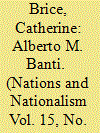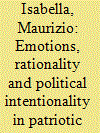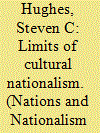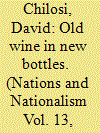| Srl | Item |
| 1 |
ID:
089211


|
|
|
|
|
| Publication |
2009.
|
| Summary/Abstract |
In the light of certain criticisms made of Alberto Banti's work (Mazzonis 2002: Beales and Biagini 2002), it may seem strange to defend him by calling him a historian of politics (even in spite of himself).
|
|
|
|
|
|
|
|
|
|
|
|
|
|
|
|
| 2 |
ID:
089208


|
|
|
|
|
| Publication |
2009.
|
| Summary/Abstract |
The procedures by which Alberto Banti defines the Risorgimento as a construction founded in the main upon deep images linked to the emotive and symbolic sphere raise question of the utmost importance regarding the very nature of Italian nationalism.
|
|
|
|
|
|
|
|
|
|
|
|
|
|
|
|
| 3 |
ID:
111490


|
|
|
|
|
| Publication |
2012.
|
| Summary/Abstract |
This article critiques the 'cultural turn' in Italian Risorgimento historiography by examining Italian Switzerland, and specifically Ticino. This area paradoxically aided and abetted Italian patriots, especially Giuseppe Mazzini, yet rejected becoming part of the Italian national project. This paradox is heightened by the fact that the vast majority of the Italian nationalist literary canon, as identified by Alberto Maria Banti, was republished in Ticino. The paradox is explained in terms of the conflict between long-standing traditions of local autonomy and the idea of any form of uniform or centralised control, as originally represented by the Cisalpine Republic and then by both versions (Napoleonic and Piedmontese) of the Kingdom of Italy. However, I also use Banti's cultural concepts to demonstrate the creation of a powerful counter-myth of Italian Swiss nationalism in the character of William Tell.
|
|
|
|
|
|
|
|
|
|
|
|
|
|
|
|
| 4 |
ID:
078560


|
|
|
|
|
| Publication |
2007.
|
| Summary/Abstract |
equates nationalism with 'the organisation of human groups into large, centrally educated, culturally homogeneous units'. As the theorist of nationalism argues, and as recent and not so recent historical research shows, the modernisation of schooling is a defining moment in this process. The objective of this article is twofold: first, to show that during the Risorgimento schooling in Piedmont became nationalist; and second, to explain why that was the case. In doing so, it is argued that: (a) the modernisation of schooling reflected the rise of laissez faire liberalism, industrialisation and the enfranchisement of the middle class; and (b) the leadership of the Risorgimento revived pre-modern ethnic symbols of patriotism to legitimate inequality and state formation under conditions of individualism.
|
|
|
|
|
|
|
|
|
|
|
|
|
|
|
|